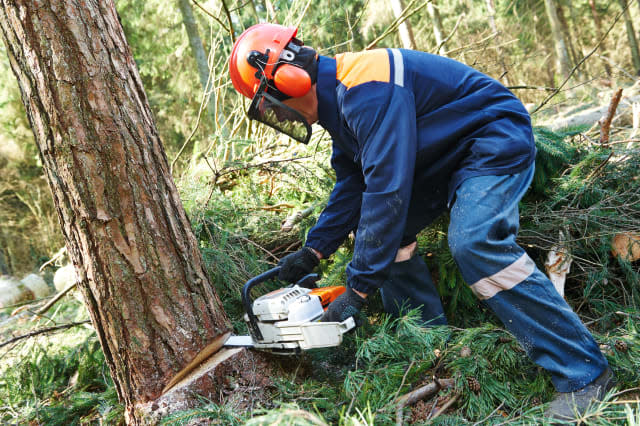How to get a job in the great outdoors

The sun is shining, the birds are singing - and millions of us are confined to stuffy offices, dreaming of the weekend. It's the time of year when any job outside looks appealing.
For most people, this is as far as it goes. Outdoor jobs inevitably involve having to cope with cold or wet weather, usually entail an early start in the morning and often mean working on your own.
But if this doesn't put you off, there are thousands of jobs that can release you from your computer screen and get you out in the fresh air - we look at some of the best.
Gardener
There's no fixed path to becoming a gardener - good news for anyone that hates formal learning and would rather work their way up. However, the Royal Horticultural Society offers a number of courses at all levels from basic diplomas to the degree-level Master of Horticulture.
There are also courses such as HNCs, HNDs and degrees available round the country, and the Royal Botanic Gardens in Kew and Edinburgh offer a number of distance learning courses.
It's often possible to get a start with an apprenticeship, and volunteering (for example at a National Trust property) can give you the experience you need.
Self-employed gardeners usually agree a rate with their employers, and this will vary around the country. However, those working for local authorities can make between £12,000 and £18,000 a year, with senior gardeners, say at a heritage attraction, making £30,000 or more.
Surveyor
Unlike many outdoor jobs, surveying is very definitely a skilled profession, and you'll need a degree or professional qualification accredited by the Royal Institution for Chartered Surveyors (RICS). This, though, can be done on the job as part of a traineeship.
There are all sorts of specialist surveyors, working in areas from rural land management to town planning, but the job essentially involves the management, valuation, buying, selling and development of land and property.
Salaries tend to start at around £20,000 but can rise to £50,000 or more for senior staff.
Activity instructor
Do you spend all your free time cycling, sailing, riding or climbing? In that case, this one could be for you. There are thousands of activity centres around the country, all of which need skilled people.
There are no specific requirements for the job, although you'll need to show you're proficient at the relevant skills; and if you're going to be working with children, you'll need Disclosure and Barring Service (DBS) clearance. A driving licence is often required too.
Starting salaries can be around £12,000 a year, rising to £25,000 a year or more for senior instructors, expedition leaders and managers. Outdoorstaff.co.uk is a good place to start looking.
Gamekeeper
Gamekeepers are responsible for making sure that there's plenty of game such as deer, pheasant, partridge and grouse for clients to shoot. That means everything from clearing woodland and burning heather to breeding game birds and training gun dogs.
There are no set qualifications, but relevant experience would help, and most people learn on the job. You'll probably need a driving licence, a firearms certificate and a shotgun certificate.
Hours are inevitably very flexible, with trainees earning around £12,000 a year, rising to more than £20,000, often with transport and accommodation thrown in.
Forester
Being a forest manager is rather like being a farmer - with rather bigger and longer-lived crops. The job involves managing forests and woodlands either for commercial or for conservation purposes.
You'll need to be fit, as the job involves everything from digging drainage ditches to cutting up trees. Some of the work can be dangerous and involves heavy machinery.
There are no required qualifications, although there are diplomas available covering forestry, arboriculture and timber. Relevant experience will make a big difference; there's a list of opportunities here.
Salaries start at around £12,000, rising to £30,000 for forest managers.
Electricity line worker
Electricity distribution workers need a good head for science - and often for heights. They are responsible for keeping the lights on by maintaining and repairing power lines around the country.
Some staff repair overhead lines, others fix underground cables and some work on electricity substations.
The usual way in is through an apprenticeship, and you'll probably need five GCSEs including maths, English and a science or technology subject. Apprentices start on around £15,000 a year, rising to over £35,000 for experienced workers.
Market trader
Working in retail doesn't necessarily mean working indoors. Becoming a market trader also gives you the opportunity to work for yourself and doesn't require any qualifications.
You'll need to rent a stall from the market operator, which is often the local authority. And you may need to wait a while for stalls to become available.
To start, you'll also need a driving licence and a vehicle, money to buy stock and public liability insurance - available from the National Market Traders' Federation (NMTF). It also has a list of markets across the country.
The money you'll make is, of course, hugely variable. A hobbyist working on a small stall once or twice a week will probably only make around £7,000 a year, while somebody working six days a week could make four times as much, especially if they're selling specialist goods.





